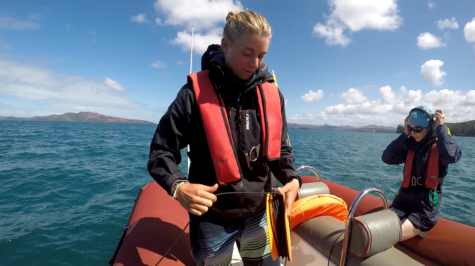In 2022, the Louis M. Herman Research Scholarship received 17 proposals from Canada, Colombia, Costa Rica, Hong Kong SAR, Madagascar, Mexico, Nicaragua, Scotland and the United States of America. The quality of submissions was extremely high, so much so that the Awards Committee is delighted to announce that this year there are two successful applicants; “Eavesdropping on Whales – Does Humpback Whale Song Convey Genetic Quality?” submitted by Franca Eichenberger of the University of St. Andrews, Scotland, and “Exploring vocal development in humpback whales” submitted by Julia Zeh of Syracuse University, the United States of America.
Eavesdropping on Whales – Does Humpback Whale Song Convey Genetic Quality?
Franca Eichenberger
Abstract:
Despite a plethora of studies, the underlying function(s) of the complex vocal display of male humpback whales remains to be unravelled. To understand the contribution of inter-sexual drivers on the function(s) of humpback whale song, the potential benefits to a female that exhibits a preference need to be evaluated. Today, more advanced methods of data collection, lab and data analyses offer new insights into the genetics, physiology and communication of whales. In birds, song complexity was found to advertise optimal Major Histocompatibility Complex (MHC) diversity, a trait affecting disease and parasite resistance. By choosing mates with complex song, female songbirds may enhance the immunocompetence and disease resistance of their offspring. Here, I aim to assess whether male humpback whale song conveys genetic quality and whether females use that information to assess and choose their potential mates. Using a long-term data set (> 25 years) of 1,618 genotyped humpback whales from a population breeding off New Caledonia, South Pacific, and song recordings of identified singers I will;
1) explore the link between song complexity and MHC diversity, and
2) investigate the possibility of an MHC-mediated female mating preference.
I employ an integrative analysis of behaviour, new cutting-edge genetic techniques and acoustic data that seeks to improve our understanding of the complex mating behaviours of humpback whales and their role within the proposed polygynous mating system. My work will also add to our comprehension of cetacean culture by improving our understanding of how cultural behaviour may affect fitness.
Twitter: @_francae
Web: http://www.smru.st-andrews.ac.uk/person/fe23/


Exploring Vocal Development in Humpback Whales
Julia Zeh
Abstract:
Despite decades of study of the complex vocal behaviour of humpback whales, the vocal repertoire of juveniles remains undescribed and it is still unclear when and how humpback whales begin to sing. In 2013, Herman et al. found that a portion of males singing on the breeding ground are likely sexually immature, raising questions about the behavior of sexually immature whales and the ontogeny of humpback whale song. The project proposed here aims to fill this important gap in our knowledge of humpback whale behavioural ecology and communication using suction cup acoustic recording tags to collect data on individual vocal behaviour. This study will take place on the breeding grounds in Maui, Hawai’i within the Hawaiian Islands Humpback Whale National Marine Sanctuary (HIHWNMS), where a large population of whales across different age classes migrates each winter. In addition to tag deployments, I will collect focal follow behavioural observations, photo ID, and biopsy samples of tagged whales. I will then measure acoustic parameters of individual whale vocalizations from the tags and model these parameters as a function of whale age class and sex. Since humpback whales are capable of vocal learning, a trait rare in nonhuman mammals, an understanding of their vocal development will provide insight into comparative studies of the evolution of complex vocal displays and vocal learning in mammals.
Twitter: @zeh_julia

![]()